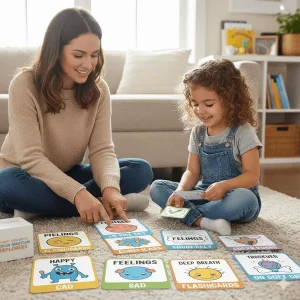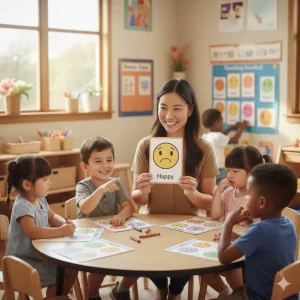Communication and Conflict Resolution: Premarital Counseling
By Prapoorna M
Last Updated: April 4, 2024
Embarking on the journey towards marriage is both exhilarating and daunting. It’s a path filled with dreams, plans, and, inevitably, a few uncertainties. This is where premarital counseling steps in—a beacon of guidance for couples ready to tie the knot. At its core, premarital counseling isn’t just about addressing potential issues; it’s about strengthening the very foundation upon which your marriage will be built. It’s a proactive step towards ensuring you and your partner have the tools, understanding, and strategies to navigate the complexities of married life together.
Through discussions on vital topics such as communication, finances, intimacy, and family planning, counseling sets the stage for open and honest dialogue. But more than that, it’s about discovery—discovering more about your partner, your collective dreams, and even the areas where you might not see eye to eye. This process isn’t about highlighting differences as roadblocks but rather as opportunities for growth and understanding.
Book Relationship Counselling now
Understanding Premarital Counseling
What Is Premarital Counseling?
Premarital counseling is a special kind of therapy designed for couples who are engaged or considering marriage. Think of it as a relationship checkup or tune-up. It’s where you and your partner can explore your expectations about marriage, discuss important topics like finances, communication styles, and family dynamics, and plan how to navigate life’s ups and downs together. The goal isn’t to find problems but to lay a strong foundation for a healthy, fulfilling partnership.
Why Consider Premarital Counseling?
So, why should you and your partner consider premarital counseling? The reasons are both simple and profound:
- Deepen Your Connection: Counseling offers a unique opportunity to explore your relationship more deeply, understand your partner’s inner world, and share your own. It fosters intimacy and trust, the cornerstones of any strong marriage.
- Improve Communication: Learn how to express your thoughts and feelings in ways that bring you closer rather than drive you apart. Effective communication is key to navigating life’s challenges together.
- Conflict Resolution: Disagreements are a normal part of any relationship. Premarital counseling equips you with the tools to handle conflicts constructively, without causing harm to your bond.
- Setting Realistic Expectations: Understand what’s realistic to expect from marriage and from each other. This awareness can significantly reduce frustration and disappointment down the line.
- Reducing the Risk of Future Conflicts: By discussing potential issues and differences upfront, you’re less likely to encounter unpleasant surprises in the future. It’s about preemptive care for your relationship.
- Building a Lasting Partnership: Ultimately, premarital counseling is about more than just avoiding problems. It’s about laying the groundwork for a partnership that grows stronger and more fulfilling with each passing year.
Setting the Right Expectations
Navigating through premarital counseling can feel like embarking on a journey with a map but not knowing all the landmarks yet. This section aims to outline the common territories you’ll explore together and clarify the role of your guide, the counselor, ensuring you embark on this journey with the right expectations.
Topics Covered
In premarital counseling sessions, several key areas are typically explored to ensure you and your partner have a comprehensive understanding of each other’s views, values, and expectations. These discussions are not about right or wrong answers but about finding common ground and understanding differences. Here are some topics you can expect to cover:
- Finances: Money matters are a common source of tension in marriages. You’ll discuss budgeting, saving, spending habits, and financial goals to ensure you’re on the same page.
- Intimacy and Affection: Understanding each other’s needs for physical and emotional intimacy is crucial. This includes conversations about sexual expectations, affection, and ways to maintain a connection over time.
- Family Planning: Whether or not to have children, when to have them, and how many are discussions that can shape your future together. It’s also important to talk about parenting styles and expectations.
- Dealing with In-Laws and Extended Family: Families can be a source of support or stress. Discussing boundaries, expectations, and how to handle family dynamics is essential for marital harmony.
- Roles and Responsibilities: Understanding each other’s expectations regarding roles within the marriage, household chores, and career ambitions can prevent future conflicts.
Read more: Marital Bliss: How to Make Your Marital Life Blissful?
Key Skills Developed Through Premarital Counseling
| Skill | Description | Why It Matters |
|---|---|---|
| Communication | The ability to express thoughts, feelings, and needs clearly and openly. | Essential for resolving conflicts, building intimacy, and making joint decisions. |
| Conflict Resolution | Techniques for addressing disagreements constructively without causing harm to the relationship. | Prevents conflicts from escalating and helps couples find mutually satisfying solutions. |
| Financial Planning | Collaborative approaches to managing finances, setting budgets, and planning for the future. | Reduces stress and disagreements about money, one of the most common issues in marriages. |
| Emotional Intimacy | Building a deeper emotional connection and understanding between partners. | Strengthens the bond and resilience of the relationship, fostering a sense of security and love. |
| Future Planning | Aligning goals related to career, family, and lifestyle. | Ensures both partners are working towards shared objectives, enhancing unity and purpose. |
The Role of a Counselor
A premarital counselor acts more as a facilitator than a director in your relationship’s story. Here’s what they do and don’t do:
- Facilitate Discussions: Counselors create a safe and open environment for you to express your feelings, fears, and expectations. They guide conversations, ensuring both partners feel heard and understood.
- Provide Tools and Techniques: They equip you with communication and conflict-resolution strategies that can be applied not just during the sessions but in your everyday life as a couple.
- Encourage Self and Mutual Exploration: Counselors help you explore your individual backgrounds and beliefs and how they may impact your relationship, promoting understanding and empathy.
- Do Not Give Direct Advice: Unlike the common misconception, counselors don’t tell you what to do or make decisions for you. Instead, they help you arrive at your own informed decisions through guided discussions.
- Do Not Take Sides: A counselor’s role is to remain neutral without taking sides. Their goal is to support the relationship, helping both partners feel valued and understood.
Learn more about our article on How to Find the Right Marriage Counsellor?
Comparing Premarital Counseling Approaches
| Counseling Approach | Focus Areas | Best For Couples Who… |
|---|---|---|
| Gottman Method | Building friendship, managing conflict, creating shared meaning | Desire research-based strategies for strengthening their relationship |
| Emotionally Focused Therapy (EFT) | Enhancing emotional intimacy, developing secure attachment | Seek to deepen their emotional connection and understand each other better |
| Solution-Focused Therapy | Setting goals and solving problems in the relationship | Want to focus on practical solutions and future goals rather than past issues |
| Narrative Therapy | Reauthoring the stories, couples tell about their relationship | Wish to explore and change how they perceive and interact within their relationship |
Making the Most Out of Your Sessions
To build a durable and loving relationship, the work doesn’t stop when you step out of the counseling room. Making the most of your premarital counseling sessions involves two critical components: open communication during sessions and the commitment to apply what you’ve learned in your daily life together. Here’s how you can deepen your connection and ensure lasting benefits from your counseling experience.
Open Communication
The cornerstone of effective premarital counseling, and indeed any strong relationship, is open communication. It’s the willingness to share your thoughts, feelings, fears, and desires honestly and the readiness to listen to your partner do the same. This level of openness doesn’t always come naturally and may require you to step outside your comfort zone. Here are a few tips to foster this essential aspect of your relationship:
- Be Present: During your sessions, give your partner your full attention. This means putting aside external distractions and focusing on the here and now.
- Practice Active Listening: Listening is more than just not speaking. It’s about engaging with what your partner is saying, asking clarifying questions, and reflecting back what you hear to ensure you understand fully.
- Express Yourself Clearly: Try to articulate your thoughts and feelings as clearly as possible. Remember, it’s not about making a case but sharing your perspective.
- Stay Open-Minded: Premarital counseling may reveal new facets of your partner’s personality or thoughts. Approach these revelations with curiosity and openness, not judgment.
Also read: Better ways to communicate in relationships
Homework and Practice
What happens between sessions is as important as what happens during them. Your counselor may provide “homework” or exercises to practice at home. These assignments are designed to reinforce the communication skills and conflict resolution techniques you’ve discussed in your sessions. Here’s why they’re so vital:
- Real-World Application: Practicing these skills in real-life scenarios helps solidify them, making it easier to turn to them in times of stress or disagreement.
- Continuous Improvement: Each time you successfully navigate a difficult conversation or resolve a conflict using these techniques, you’re building a stronger, more resilient relationship.
- Deepening Understanding: Homework often involves reflective exercises that can help you better understand your partner’s—and your own—inner world, desires, and fears.
Remember, the goal of these exercises isn’t perfection but progress. Approach them with a spirit of exploration and mutual support, and you’ll find your relationship growing stronger with each passing day.
Choosing the Right Premarital Counselor
Finding the right premarital counselor is like choosing a guide for an important journey—the right one can make all the difference. Here’s how to ensure you find a counselor who aligns with your needs, values, and goals:
- Look for Experience and Specialization: Start by seeking counselors who specialize in premarital or couples therapy. Their experience in addressing common and complex relationship issues can provide you with insights and tools tailored to your unique journey.
- Consider Compatibility: Your counselor should be someone both you and your partner feel comfortable with. It’s important that their approach and personality resonate with you, fostering an environment of trust and openness.
- Check Qualifications: Verify their credentials and training in couples therapy. Accredited therapists with a background in family or marital counseling bring a wealth of knowledge and expertise to their sessions.
- Ask About Their Methods: Different counselors have different approaches. Some may use specific techniques such as the Gottman Method or Emotionally Focused Therapy. Ask potential counselors about their methods and choose one whose approach aligns with your preferences.
- Discuss Availability and Logistics: Make sure their schedule, location (or availability for online sessions), and fee structure fit your needs. Accessibility is key to maintaining consistency and progress in counseling.
Questions to Ask Potential Counselors:
- “Can you describe your experience with premarital counseling?”
- “What is your approach or philosophy regarding couples therapy?”
- “How do you handle conflicts that may arise during sessions?”
- “Can you share success stories or how you’ve helped couples in the past?”
Conclusion
Premarital counseling is a crucial step toward building a strong, lasting marriage. It’s about more than just planning for a wedding; it’s investing in your future together, ensuring you both have the tools to communicate effectively, understand each other deeply, and face life’s challenges united. By discussing important topics and learning to navigate differences, you’re laying the foundation for a healthy, resilient partnership.
Wellness Hub is here to support you on this journey, connecting you with experienced counselors and resources to guide your path. Embrace this process as an opportunity to strengthen your bond and prepare for a lifetime of shared growth and happiness. Premarital counseling isn’t just preparation—it’s the first step in a lifelong adventure together.
Frequently Asked Questions:
1. What is Premarital Counseling?
Premarital counseling is a type of therapy for couples who are considering marriage. It helps partners communicate effectively, resolve conflicts, and set realistic expectations for their future together, laying a strong foundation for a lasting marriage.
2. Why Should We Consider Premarital Counseling?
Couples should consider premarital counseling to deepen their connection, improve communication skills, understand financial management together, discuss family planning, and navigate in-law relationships. It’s a proactive step towards reducing future conflicts and enhancing relationship satisfaction.
3. What Topics Are Covered in Premarital Counseling?
Key topics include financial planning, intimacy and affection, roles and responsibilities within the marriage, dealing with in-laws and extended family, and family planning. The aim is to discuss and align these crucial aspects of life together.
4. How Do We Choose the Right Premarital Counselor?
Look for a counselor who specializes in premarital or couples therapy with relevant experience and qualifications. Consider their counseling methods, compatibility with both partners and logistics like scheduling and fees. Asking about their approach and success stories can also help in making a decision. Wellness Hub can assist in connecting you with suitable premarital counselors.
5. What Are Common Concerns with Premarital Counseling?
Common concerns include fear of judgment, uncovering uncomfortable truths, doubts about the effectiveness of counseling, and worries about opening up. It’s important to remember that these feelings are normal and part of the growth process in strengthening your relationship.
6. How Can Premarital Counseling Benefit Our Relationship?
Premarital counseling can significantly benefit your relationship by providing tools for effective communication, conflict resolution, and setting realistic expectations. It’s an investment in your future, ensuring that both partners are prepared for a healthy, happy marriage.
7. Can Wellness Hub Help Us Find a Premarital Counselor?
Yes, Wellness Hub offers a curated network of experienced premarital counselors. Our platform makes it easier for couples to find a professional who meets their needs, preferences, and logistical requirements, supporting them on their journey to a fulfilling marriage.
8. How Long Does Premarital Counseling Typically Last?
Premarital counseling sessions can vary in length, typically ranging from a few weeks to several months. The duration depends on the couple’s specific needs, goals, and the counseling approach. It’s important to discuss expectations with your counselor at the outset to tailor the experience to your relationship.
9. Is Premarital Counseling Effective for All Couples?
Yes, premarital counseling is effective for all couples, regardless of the stage of their relationship. It provides valuable insights and tools that can enhance communication, deepen understanding, and prepare couples for the challenges of married life. Couples who undergo premarital counseling often report higher levels of marital satisfaction and are better equipped to navigate conflicts.
10. Can We Do Premarital Counseling Online?
Absolutely. Many counselors and platforms, including Wellness Hub, offer online premarital counseling sessions. Online counseling provides flexibility and convenience, making it easier for couples to access support regardless of their location or busy schedules. It can be just as effective as in-person sessions, with the added benefit of fitting into your lifestyle.
About the Author:
Prapoorna Mangalampalli
M.Sc., M.A., (Dual Masters in Psychology & English) – Counselor (6+ years of experience)
Prapoorna armed with a passionate dedication fueled by dual Master’s degrees in Psychology and English, Prapoorna sheds light on and elevates human experiences. Over 6+ years of experience fuel her insightful approach to counseling, offering profound empathy and guidance across diverse areas like online, marital, relationship, child, family, and career counseling.
At Wellness Hub, she thrives in a team environment that values innovation, compassion, and achieving results for their clients.
Connect with Prapoorna to learn how she can help you or your loved one find their voice and build a brighter future.
Book your Free Consultation Today
Parent/Caregiver Info:
Client’s Details:
* Error Message









